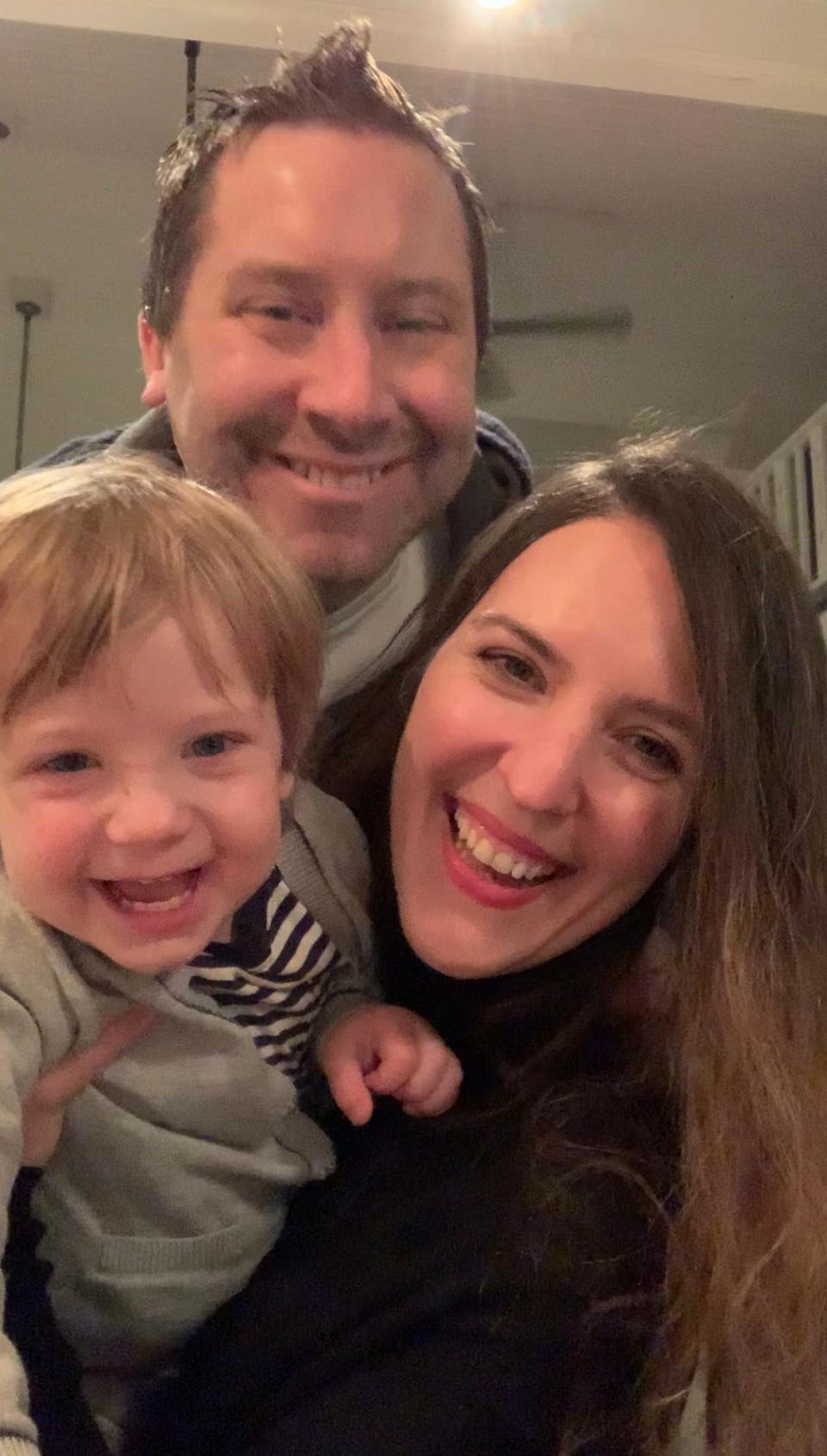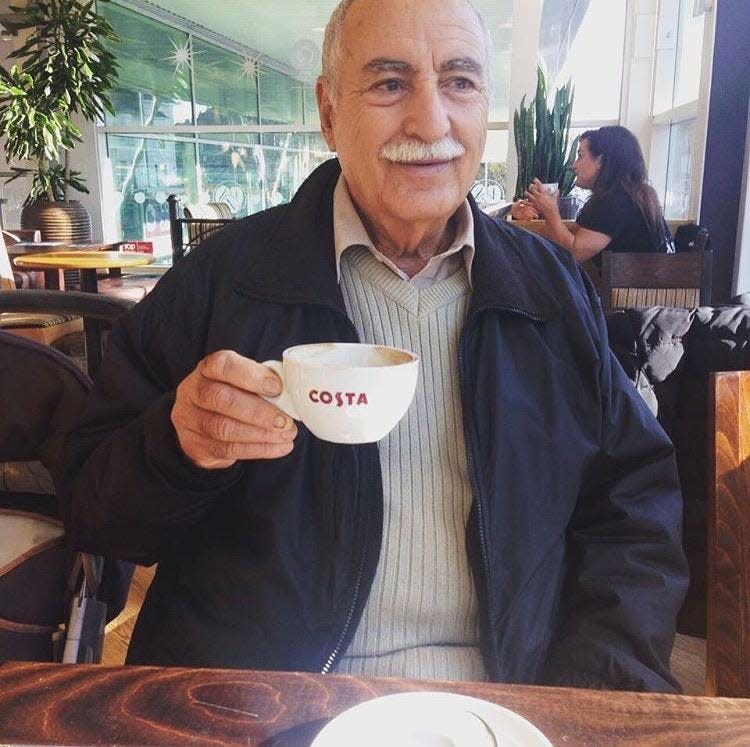'You don't have a second chance': Muslim Americans lament lost time with loved ones after lifting of travel ban
Ever since her son was born in 2019, Sarvin Haghighi, a Tehran-born visual artist in Chicago, has made daily video calls to her parents so they can share in their grandson’s life. And every day, she said, it breaks her heart.
Kian, who will turn 2 next month, is excited to show his toys to his Iranian grandmother when he sees her on screen. But, ultimately, Haghighi wishes her mom could hold and hug her grandson.
“There’s not a day that I don’t have a teary eye,” Haghighi said.
The two have been separated by more than miles: As Iranian citizens, her parents have been barred from visiting the United States by an executive order issued in 2017 by former President Donald Trump. The so-called Muslim Ban, which on the grounds of national security prohibited U.S. entry by people from certain primarily Muslim countries, including Iran, was rescinded by President Joe Biden on his first day in office.
Biden’s immediate and decisive lifting of that ban, as well as others targeting several African and Asian nations, brought long-awaited relief to thousands denied the chance to see families and loved ones in the United States. But while the hope of reconnection now looms as a reality for many, so, too, does a recognition that many missed moments are irretrievably lost.
“In addition to it being excruciatingly painful to be apart from loved ones, you’ve missed out on milestone opportunities, educational opportunities, the chance to celebrate or mourn together,” said Avideh Moussavian, legislative director for the National Immigration Law Center. “You can never make up for that.”
For many ready – and in some cases, driven – to leave their countries to join or visit relatives or loved ones in the United States, the Trump administration's ban upended consequential plans and hopes. Some filed for waivers and waited as applications were held up indefinitely; others bailed, forced by violence-torn homelands or other circumstances to resettle in places where they had no family.
“Others are still in refugee camps,” said Aarti Kohli, executive director of San Francisco-based Asian Americans Advancing Justice – Asian Law Caucus. “I mean, this was four years. For those of us experiencing COVID and not seeing others over the period of a year – this just magnified that.”
Grandparents missed seeing grandchildren come of age. Others were kept from spouses and children. Marriages ended. People died without the ability to tell their loved ones goodbye.
“You don’t have a second chance,” Kohli said. “You don’t have a ‘later on.’”
In 2017, Haghighi traveled to Australia, where her siblings are citizens and were hosting their parents, for a family visit. It was soon before Haghighi, who by then had her green card, would be eligible to apply for U.S. citizenship, a process she planned to initiate once she returned to Chicago to rejoin her husband, Andy Culley, who she'd met while climbing Mount Kilimanjaro in 2011.
Two days before her flight from Melbourne, Trump signed Executive Order 13769 – and suddenly, Haghighi found herself stranded and in limbo. In a semi-panic, with no idea how long she and Culley would be separated, the couple discussed their options. At one point, they talked about relocating to Canada.
Culley joined daily demonstrations and consulted with immigration lawyers at Chicago’s O’Hare International Airport. With the aid of advocacy groups like the American Civil Liberties Union, Haghighi was able to return within a week. She was so grateful to be home, she said, that her legs turned to jelly as she approached the customs kiosk, practically speechless when she was let through.
'It's been a hard four years'
According to Kohli, more than 40,000 people were denied visas as a result of the ban, though it’s difficult to know how many more were discouraged from applying once it went into effect. Despite the ban's stated anti-terrorism rationale, she said, little evidence indicated that it had been based on a systematic review of such concerns.
Two early iterations of the ban were quashed by federal judges as discriminatory on religious grounds, but the Supreme Court upheld a third version in 2018 that prohibited travelers from Iran, Libya, Syria, Yemen, Somalia and North Korea, as well as political officials from Venezuela.

In early 2020, multiple Asian and African nations were added as well – Eritrea, Nigeria, Kyrgyzstan, Myanmar, Sudan and Tanzania.
That Biden immediately lifted the travel bans was symbolically important, advocates said, as was wording in his executive order that strongly condemned them not just for the pain they had caused but for violating American ideals.
“These actions are a stain on our national conscience and are inconsistent with our long history of welcoming people of all faiths and no faith at all,” the order read. “… They have jeopardized our global network of alliances and partnerships and are a moral blight that has dulled the power of our example the world over.”
Biden's order instructed the State Department to produce, within 45 days, a plan for expediting applications of those still awaiting waivers under the ban, as well as for fresh reconsideration of applications denied as a result of the ban. Advocates hope those reconsidered applicants can have their fees waived, as well. The 45-day period ends March 6.
“It’s been a hard four years,” said Subha Varadarajan, a legal and outreach fellow for the No Muslim Ban Ever campaign, a coalition of more than 100 civil and human rights organizations that fought to overturn the ban through litigation and advocacy. “Everyone’s just relieved.”
And while change won’t come overnight, Kohli said, “the most important thing is that the president has acknowledged the harm and discriminatory intent of the ban and made a commitment to undo it. That’s a big first step.”
Even as the lifting of the bans inspired optimism, advocates said, a sense lingers that they reflected a United States still grappling with elements of white supremacy and anti-Muslim bias.
“Islamophobia is one part of that bigger challenge that this country faces,” Kohli said. “We’re a deeply troubled society. We need a reckoning.”
'The fight is not over yet'
For Anas Tresh of Palo Alto, California, recent years have proved to be “a very polarizing time.” As a Sacramento-born medical resident at Stanford University, he’s had to distance himself from certain friends over political disagreements, especially those related to the travel ban.
Tresh, whose parents are from Libya, spent a portion of his high school years there until the instability of civil war pushed the family to return to the U.S.
His Libyan grandfather, Abdulmagid Ghaffar, visited occasionally and was in California in summer 2019 when Tresh returned from a medical school rotation at the University of Michigan and noticed that Ghaffar, who also holds U.S. citizenship, appeared jaundiced.

Tests indicated a cancerous mass in Ghaffar’s pancreas – but the travel ban prevented his other children in Libya from being with him during the worrisome period that followed as he underwent several months of chemotherapy and then surgery early last year.
“You can only imagine,” Tresh said. “Everyone was extremely worried, wondering, ‘Are we going to see our father again?’ And for him, being away from them for so long was disheartening.”
As a family of faith, they hoped for the best, even as they silently feared the worst. “And we recognized how repulsive this ban was, and that if he really was in his last days, that nearly his entire family was in Libya and wouldn’t be able to see him.”
Fortunately, surgeons were able to extract the mass, confident they had gotten it all. And as soon as Ghaffar was strong enough to travel, he returned to Libya to continue his recovery.
“As soon as he got back, he sent us a picture of him with his grandkid on his lap and a big smile on his face,” Tresh said.
Tresh knows others experienced much worse situations and said it’s difficult not to feel resentment toward the previous administration for the collective trauma he feels was unnecessarily inflicted as a result of the ban.
“For us, as Libyans and Muslims being here in America, where we’re feeling constantly targeted and discriminated against, we recognize that this is just one injustice that has been corrected,” he said. “But there’s still a long way to go, and we’re hoping it never happens again.”
Advocates said healing can begin with the No Ban Act approved by the House last summer, which directly addresses the section of the Immigration and Nationality Act that Trump drew upon to create the bans. The proposed measure alters language to thwart religious-based discrimination and adds balances to prevent future presidents from unilaterally imposing similar restrictions.
The act is now included in the U.S. Citizenship Act of 2021 that Biden has sent to Congress.
“It’s very important to make sure there are reasonable limits on the what the chief executive has the authority to do,” said the National Immigration Law Center’s Moussavian, adding that further outreach will be needed to combat the “tremendous trust deficit” that remains in communities affected by the ban.
“Nothing can make up for the pain of that separation or the lost moments and opportunities to be with people you love,” she said.

Haghighi did what she could, and in early 2019, she flew to Australia to give birth to her son so that her parents could share the moment.
"I couldn’t imagine not having my mom there with me when my son was born," she said.
Haghighi now volunteers in Chicago with the kind of advocacy organizations that had helped solve her situation, feeling like she needed to do something to help.
“This ban took away a lot of love that my son could have gotten from his grandparents, and I can never get that back,” she said. At the same time, “it feels great to be involved in such a powerful movement. The fight is not over yet. We need to make sure it doesn’t happen again. Not to us. Not to anybody.”
This article originally appeared on USA TODAY: Muslim travel ban: Biden reversal gives relief to divided families
